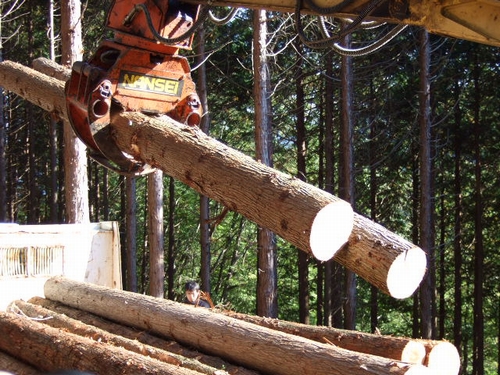August 1, 2013
Use of Forest Resources Increases due to Rapid Expansion of Biomass Generation
Keywords: Ecosystems / Biodiversity NGO / Citizen Renewable Energy
Construction of relatively large-scale biomass power plants with a capacity of 5,000 kilowatts or more is planned throughout Japan. According to the Biomass White Paper 2013 (in Japanese), which was issued in May 2013, there are currently plans to build woody-biomass power plants at 60 or more locations nationwide. Many of these are large-scale plants with capacities exceeding 10,000 kilowatts
It is expected that these plans will use large quantities of previously underused forest resources such as forest thinnings and other unused wood material. Each large-scale power plant will require a substantial amount, over 100,000 cubic meters per year, of unused wood material as fuel. This requires sourcing from a broad area. Due to this, there are many issues in terms of adequately utilizing forests as local resources.
Up to now, waste materials such as municipal solid waste and construction debris have been mainly used in biomass generation. However, according to the feed-in tariff system introduced in Japan in July 2012, the purchase price of power is set according to the power generation method and type of fuel used. Compared to other waste-material fuels, biogas power generation via methane fermentation and woody-biomass power generation using unused wood material receive preferential treatment and have a higher purchase price. Meanwhile, preferential treatment for co-generation with higher energy efficiency has not yet been considered, and essentially, measures have not been established to promote the dissemination of utilization of heat generated from relatively small-scale woody-biomass operations.
The "Principles Concerning the Promotion of Sustainable Use of Biomass Energy in Japan" that was jointly proposed by several non-governmental organizations in February 2012 states the need for economic and social considerations for designing an appropriate feed-in tariff system, in addition to reductions in greenhouse gas emissions, the preservation of sound ecosystems, and the like.
Written by Hironao Matsubara, Institute for Sustainable Energy Policies
Related JFS article:
New Methane Fermentation Method Developed for Garbage-Herbaceous Composite
Community Power Revolution Spreads in Japan
METI Announces New Buyback Price for Renewable Energy
Related
"JFS Newsletter"
- 'What Are the Roles of Zoos Today?' - Interview with Director of the Popular Asahiyama Zoo
- Nishiawakura's Initiative for 100% Energy Self-Sufficiency, and a Municipal ICO Scheme
- 15-Year Integrated Forest Environment Education in Shimokawa, Hokkaido to Support Sustainable Forest Management
- Fifth Contest to Award Excellent Environmental and Social Practices by Junior High, High School Students
- Increase Revenues without Increasing Catches -- How the Sustainable Sakura Shrimp Fishery in Suruga Bay Does It



